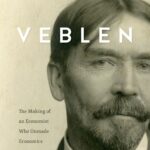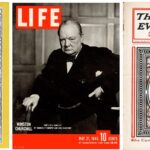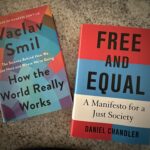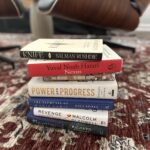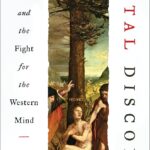It’s the time of the year when everyone lists the most notable books of the year, just in time for the Christmas season. “What is the point of Books of the Year, that seasonal ritual which is as much part of Christmas as cheese footballs?” asks Stephen Moss, the “embittered former literary editor” of The Guardian. “Every year, literary editors feel that there is nothing their readers want more than a group of superannuated literary types telling them what they have enjoyed during the previous 12 months. There is no evidence that anyone reads these self-satisfied musings, but the papers persist anyway, competing desperately for the glitziest names.”

Each year at this time, I like to list a few books that I intend to read during the upcoming year. Usually, I get to about half of them; other interesting books published during the year often crowd a couple of my intended reads off the list. That said, here are a couple of books I’d like to get to.
Business books:
The Mind and the Market, by Jerry Muller.
This has been on my list for a little while. It looks to be an interesting look at philosophy and economic markets. From the publisher: “Ranging across an ideological spectrum that includes Hobbes, Voltaire, Adam Smith, Edmund Burke, Hegel, Marx, and Matthew Arnold, as well as twentieth-century communist, fascist, and neoliberal intellectuals, historian Jerry Muller examines a fascinating thread of ideas about the ramifications of capitalism and its future implications. This is an engaging and accessible history of ideas that reverberate throughout everyday life.”
The New Financial Order by Robert Shiller.
A Stanford economics professor, Shiller proposes some rather radical policy changes in how this country might deal with personal finance. He has some very interesting ideas for preserving wealth, insuring career risks, and encouraging economic growth in the coming century. He seems to have his eye on what’s really going on in the economy. If you remember, he wrote his book Irrational Exuberance shortly before the dot-com implosion in 2000.
Politics:
A Necessary Evil by Garry Wills.
Do we need the federal government? Opinions about the governments role in America have changed throughout the years. This is a classic by a Pulitzer-Prize winner.
Freedom from Fear by David Kennedy.
At 871 pages, this Pulitzer-Prize winning tome would take some effort, but it would be well worth it. (I’m convincing myself right now to start). It’s a comprehensive look at America between 1929 and 1945.
Biography:
Theodore Rex by Edmund Morris.
It’s the follow-up to The Rise of Theodore Roosevelt that I have been meaning to get to for some time.
Science:
 What Is Art For? by Ellen Dissanayake.
What Is Art For? by Ellen Dissanayake.
Normally archaeology and science have been treated separately from art and art history in scholarship circles–as a separate discipline. Yet this independent scholar turns those ideas on their head. I have been wanting to read this for some time. From Book News: “A new theory of the evolutionary significance of art (meaning not only visual art, but music, poetic language, dance, and performance). Art is regarded from a biobehavioral or ethological viewpoint and is shown to be a biological necessity in human existence and a fundamental characteristic of the human species. Dissanayake claims that the arts evolved as a means of making socially important activities memorable and pleasurable, and thus have been essential to human survival.”
Maybe I should leave it there, and leave room for some of the new books to be published next year. If you are interested in some of those year-end, best-of lists, here are a few:
New York Times 100 Notable Books of the Year


